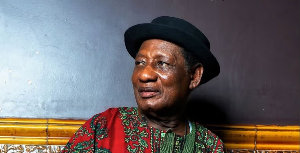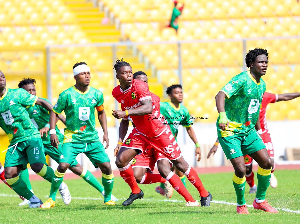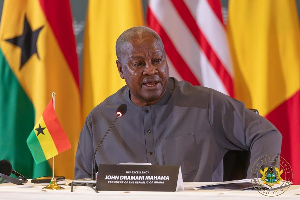THE MACHIAVELLIAN AKUFO-ADDO
The University of Fort Hare, a South African-based institution of higher learning and one of the oldest in the country, recently conferred an honorary doctorate on Akufo-Addo, the presumptive presidential nominee of the ethnocentric New Patriotic Party (NPP), an opposition in waiting.
The citation for this honor read in part:
“Mr. N.A.D. Akufo-Addo’s legal and political leadership roles, both past and present, significantly contribute to human rights, constitutional democracy as well as socio-economic development as enshrined in the University of Fort Hare’s strategic vision and mission. It is in view of this that the University of Fort Hare is honored to be associated with such a distinguished lawyer and politician.”
Is this not interesting coming in the wake of Akufo-Addo’s importation of three South African mercenaries into the country under the cover of darkness and in stark contravention of national security laws?
One therefore wonders why no fanfare has accompanied this honor in Ghana!
On the surface, though, one might be compelled to easily interpret this gesture as a face-saving diplomacy on the part of South Africa to “heal” any political wound of misunderstanding that its three mercenaries may have created in the body of international relations involving the two friendly and fraternal nations, for better or for worse.
This is because diplomacy has many forms, shapes, or shades.
The South Africans could as well have been playing the politics of mind games.
We should try and see this in the larger context of the post-colonial relationship between the two countries, during which Kwame Nkrumah, “Ghana’s founding father” and “the modern father of Pan-Africanism,” and his teachable influence, selflessness and political vision loomed large over the entire geopolitical landscape of Southern Africa (Read: Not just SOUTH AFRICA) at the peak of colonialism and Apartheid. There is therefore no doubt that Nkrumah’s relatively pragmatic and rational ideals (and those of Mandela and his colleagues and of other African leaders such as Julius Nyerere) would eventually culminate in the dismantling of Apartheid.
Evidently, unbeknownst to many, however, Nkrumah’s contributions to the decolonization of South Africa have long since been recognized by an international body, the United Nations (a U.N. Special Session posthumously awarded Nkrumah a Gold Medal), and by the government and some influential national institutions of South Africa. The latter is lent credence as the following memorable part eulogy, part history, and part citation eloquently demonstrate:
“Ingwe Mabalabala Holdings, an event organizer in South Africa in conjunction with the National Heritage Council of South Africa yesterday, presented a posthumous award to Dr. Kwame Nkrumah for his contribution towards the emancipation of South Africans…
“According to Mr. Enoch Ampofo who represented the event organizers, the award which is known as the founders award is given to persons or personalities who have contributed immensely to the elevation and improvement of the living conditions of their society.
“Ever since its inception, the likes of Nelson Mandela, Martin Luther King and a great many others have been awarded for their selflessness and dedication to the human race.
“Mr. Ampofo said the first president of Ghana had such a big pride in the hearts of the people of South Africa adding that, ‘especially those who were oppressed during the apartheid period.’
“Gaining perspectives into how Dr. Kwame Nkrumah has affected the lives of people in South Africa, I found out that back in the days of Apartheid, the oppressed people went to school and were taught about the principles of Kwame Nkrumah or Nkrumahism.
“Receiving the award on behalf of government, the Minister of Chieftaincy and Culture, Alexander Asum -Ahensan said the role of Dr. Kwame Nkrumah in the independence of most African countries could not be under-estimated…
“The SATMA Awards which was created in 2005 is a momentous event in South Africa…
Technically speaking, then, Nkrumah made this recognitory gesture extended to Akufo-Addo today possible even by a long short.
Yet Akufo-Addo was never and had never been a Danquahist in the truest sense of the label, to start with, if there ever was even such a label in the first place. Nkrumah was just too large a global figure to subsume peripheral politicians such as Danquah, Obetsebi-Lamptey, Busia et al.
Akufo-Addo was an ardent Nkrumahist to the core, a die-hard follower of and strong believer in the ideals of Nkrumah’s political philosophy and ideology. This is in the open books of Ghana’s political history.
Then again Akufo-Addo and other influential members of his immediate and extended family, such as Aaron Eugene Kofi Asante Ofori-Ata who became a Minister for Local Government and a Minister for Justice in Nkrumah’s Convention People’s party (CPP), chose the relatively pragmatic and rational ideals of the political philosophy and ideology of Nkrumah over their relative’s, J.B. Danquah’s. Yet he cannot also deny cutting his teeth on the back of Nkrumah as a prelude to his political traction.
In more specific ways, therefore, Akufo-Addo somehow owes his political stature today to the political vision of the quantum genius called Nkrumah, not Danquah, although evidently he has also grossly been squandering, misapplying and misusing this political and ideological bequest for self-seeking purposes and more specifically, for feeding, for nurturing, and for sustaining his self-aggrandizing political proclivities. This un-pragmatic and unwise approach to political practice is gradually turning out to be his undoing! More so that is no one’s fault, but his own.
As a matter of fact, he does not see the highest office of the land as an active if noble expression of the popular will, elective franchise, or popular sovereignty but as a dynastic entitlement of sorts. This may partly explain his strategic and tactical distancing from the once-powerful teachable model that provided the intellectual, moral and philosophical anchor for his now-celebrated political traction among a section of the Ghanaian public—and this—chiefly coming all the way from the social-political turbulence of the immediate post-colonial dispensation to the relative peace and political stability enjoyed by all Ghanaian citizens in the Fourth Republic.
This questionable model of distancing approach has, regrettably, entailed and been characterized by outright political and historical lies, selective amnesia and fabrications, lack of commonsense, and general ahistoricism on the part of Akufo-Addo and his advisors. We should never gloss over these sensitive aspects of our political history for the sake of posterity and not for the convenient self-aggrandizing entitlements some politicians secretly harbor in their wicked hearts!
One such is when Akufo-Addo in his acceptance speech referred to his ancestral fifth columnist and anti-masses politician Danquah, as “the father of Ghanaian nationalism,” when in fact he [Danquah] was not a nationalist, a figure who was not even important in African and global politics, and rightly so, he still has not been acknowledged as an important figure in African and global politics having been rejected at the polls whenever and wherever he stood for national elections.
On two different occasions (1954, 1956) for instance, Nkrumah’s CPP roundly defeated and succeeded in quashing the political hopes of Danquah in his own backyard, Akyem Abuakwa Central constituency. That memorable dismantling of Danquah’s political hopes continued through the 1960 general elections, which the British did everything they could to help him win including masterfully adopting underhanded strategies and tactics in behalf of their man, yet the generally bland and unimaginative political stooge of the West came up short every which way.
Even when he [Danquah] entered the National Assembly/Gold Coast Legislative Assembly, he did so through the backdoor. He left the National Assembly just when his ex-wife Mabel Dove Danquah, a member of the CPP, entered it. This begs the question of why a politician who could not even win elections in his own backyard and any part of the country could be described as “the father of Ghanaian nationalism.”
Ironically, and rather unexpectedly, he, Akufo-Addo, in his keynote acceptance speech would acknowledge the lasting and practical wisdom in Nkrumah’s call for African unity as a prelude to the continent’s potential growth, development and progress. Here is what Ghanaweb has to say on this (our emphasis):
“Highlighting the importance of the work of his [Danquah’s] compatriot, Kwame Nkrumah, the NPP flagbearer stressed that African unity, through the political and economic union of the continent, remains the most effective context within which to maximise the collective power of the African peoples, and achieve the continent’s full potential.
“‘Others have done so in America, in Europe and in Asia. We must do the same in Africa. We cannot continue to be either the pawns or the victims of history. We have a huge, unique contribution to make to the growth of world civilisation. It is time for us to step forward’…”
What Akufo-Addo referred to as Africa’s “unique contribution to make to the growth of world civilization” was what Nkrumah essentially called “the African Genius.” His “we cannot continue to be either pawns or the victims of history” was Nkrumah’s “We face neither East nor West; we face forward.” The irony is that the West used Danquah and some of his colleagues as pawns to destabilize the country and set it on a path of underdevelopment. The other laughable irony is that while he says we should not use the tag of “victims of history,” Akufo-Addo conveniently uses that same tag to make a case for his entitlement to the highest office in the land.
And finally, what he also referred to as “step forward” was what Nkrumah fundamentally called “Forward Ever, Backward Never.” As simple as that! Yes, Akufo-Addo went so far as to adopt an Nkrumah-esque philosophical, moral, and political language to appease his South African audience, a people who identify with and can only understand and appreciate the powerful language of Nkrumah’s progressive politics of emancipation. There is no question about this.
Danquah, on the other hand, sits forlornly on the sidelines of the political and historical consciousness of the great people of Southern Africa generally and South Africa particularly. But Akufo-Addo is a clever politician in some unique ways. He knows for sure that his South African audience would give him an ear and on that basis inch closer to the politically and historically invisible Danquah if only he turned the language of his keynote address into a focus on Nkrumah.
Yet his statement, quoting Danquah, to the effect that “Your generation has to ensure the fulfilment of the statement, made almost 70 years ago in 1949 to the Gold Coast Legislative Assembly by Joseph Boakye Danquah, the father of modern Ghanaian nationalism, that ‘the two things go together, economic freedom and political freedom. And we must have the two together in this very age and in the shortest possible time…” is problematic as it does not generally or necessarily testify to the hard facts of political realism and history, contemporary and otherwise.
In other words, the two do not necessarily have to sit side by side to ensure that equity and social justice become a bold statement of moral and political fact in consequence of human destiny and in improving the human condition. Yet Danquah and Akufo-Addo may not necessarily be dead wrong on this very question of interpretation. Context is what probably matters here. This is very important.
This is because Danquah spoke at a time when the British were not prepared to grant both, economic freedom and political freedom, to black Gold Coasters and when Gold Coasters, in fact, were literally slaves of the vampiric British Empire (see Bob Marley’s “Crazy Baldhead”), just as Danquah was an intellectual slave of the West. Nevertheless Danquah’s was merely a hyperbolic dream, a description akin to the kleptomaniacal daydreaming of Victoria Hammah!
Here are a few notable examples: Black South Africa secured political freedom first as a prelude to economic freedom. Likewise, Black America secured political freedom first as a prelude to economic freedom. Australian Aborigines and almost every colonized people had had to go through the political corridor first in order to get to the final destination of some form of economic freedom. Political freedom and economic freedom can then sit side by side once the former secures some entrenchment in the political economy of any progressive body politic.
It could not be otherwise where the context is exclusively and necessarily historical. And that is, it is through societal anchoring of political freedom that the progressive structures of economic freedom can also be put in place to safeguard pressing issues and questions of social justice, equity, respect, race and ethnic and human relations, development economics and sociology.
Even with political freedom in place, there is no foolproof guarantee that economic freedom is a certainty. We have all seen how massive political corruption and mediocrity in the corridors of South African politics have made economic freedom for Black South Africa a near-impossibility.
FINAL THOUGHTS
We are not saying Akufo-Addo’s cross-carpeting or crossing the floor is morally wrong—far from it. And even the enemies and detractors of Nkrumah know they cannot do without him. They also know Danquah gets some measure of “respect” and “recognition” outside his Akyem Abuakwa Central constituency if and when he is mentioned in the same breath with Nkrumah, if and when they attempt to destroy Nkrumah and his legacy just so they can elevate Danquah and put him on the same pedestal as Nkrumah. But history is not always blind, gullible, and stupid.
Of course, and rather also, it is our opinion that such a bold and important decision is one that is made either a serious or critical question of individuals’ rational or self-seeking conscience. In this regard, it is his right to enjoy his freedom of association in whichever way and however he wants to enjoy it.
That is freedom of conscience, which is more than he is entitled to as the rest of humanity. We will therefore not fault him for this singular act of personal decision as we all have our unique reasons and justifications for taking to certain preferences, rational or otherwise. Neither are we going to belittle or make light of the honor imposed on him, even though we may also have to make the case, however facilely, that the general contents of the citation stating the case for his honorary recognition merely represent a fairytale account of the man’s purported achievements.
This largely visionless politician who does not even have a convincing, effective electioneering package for Ghanaians and any sustainable, attractive political ideology and philosophy to behold, is now the toast of a country that not too long ago reportedly took part in an abortive machination aimed at overthrowing the government of Equatorial Guinea (Margaret Thatcher’s son Sir Mark Thatcher was reportedly part of this failed scheme) and three of whose citizenized mercenaries sneaked into Ghana for “subversive” reasons in behalf of the leadership of the NPP.
Akufo-Addo’s Machiavellianism, underhanded and scheming-behind-the-shadows politics, ethnocracy and ethnic politics have practically destroyed what was once a buoyant, vibrant and promising political organization that offered stiff opposition to the dictatorship of incumbent advantage. Under his leadership acid-bathing, unthinking sycophancy, intimidation of intra-partisan opponents, political gangsterism, mobocracy, lies, vigilante civil unrest, and intolerance have become the defining characteristics of his political vision.
Some influential and lay persons have deserted this party for these reasons or been forced to do so via verdicts of indefinite suspensions. For instance, Dr. Nyaho Tamakloe, one of the founding fathers of the NPP and an outspoken critic of Akufo-Addo and his leadership style, makes the following daring remarks underscoring the Machiavellian character of Akufo-Addo and his opportunistic politics:
“This sort of marriage between Jerry John Rawlings and the wife is very interesting…Because we had a nasty experience with this couple; so lately now to see Akufo-Addo in bed with Rawlings and the wife is something that must watched carefully…Out of Kumi Preko, we lost about eight people till this very day nothing has been done about it…Two years ago, President John Dramani Mahama gave me a telephone call and requested to meet the families of those who lost their lives in that demonstration.”
CONCLUDING REMARKS
FORMER REPUBLICAN NATIONAL COMMITTEE’S CHAIRMAN, MICHAEL STEELE, ON OBAMA’S NOBEL PEACE PRIZE
“It’s unfortunate that the President’s star power has outshined tireless advocates who have made real achievements working towards peace and human rights.”
FORMER POLISH PRESIDENT LECH WALESA ON OBAMA’S NOBEL PEACE PRIZE
“So soon? Too early. He has no contribution so far.”
These pointed reservations are the dilemma we may have to face, somewhat, today with the honor being done to Akufo-Addo by the great people of South Africa. Of course, Akufo-Addo is not Barack Obama given the differences in their personalities, histories, education, career choices and professional experiences, political intelligence, social and political activism, and geopolitical environments.
But their profiles, however diametrical, meet somewhere in the kind of major responsibilities such honors bestow on them. Obama was not adequately tested in the political trenches before the Nobel Peace prize came, likewise Akufo-Addo. Until then we will have to wait, and patiently, by giving him [Akufo-Addo] the benefit of the doubt as his government-in-waiting assumes office, if this does really happens, and hopefully or otherwise turns the fortunes of the country around as he has been singing.
After all, we all know what has become of the relationship between Leymah Gbowee and Ellen Johnson Sirleaf since receiving the Nobel Peace Prize, and particularly of the latter and the current state of the Liberian economy, cronyism, political corruption and nepotism. Neither are we implying that Akufo-Addo is either Gbowee or Sirleaf, nor that the Nobel Peace Prize and Akufo-Addo’s honorary Doctor of Law Degree are equivalent. Not by any measure.
We are rather talking about political pragmatism and rationalism—call it “political realism” if you so much as prefer—and how such honors may not necessarily have a direct bearing on development economics and sociology, as well as the harsh realities and complications of political economy.
Akufo-Addo and his government-in-waiting have yet to demonstrate what the honorary citation can only conceive of in the past. And Akufo-Addo should be respectively reminded that Danquah cannot and could never have been “the father of modern Ghanaian nationalism” because he [Danquah] never was even considered for a spot among the Top 100 of Greatest Africans or given the title “Africa’s Man of the Millennium.”
The latter singularly belongs to Osagyefo Dr. Kwame Nkrumah. The fact is also that the many awards, honors, and recognitions given Nkrumah from around the world were and are based on concrete achievements and continuing achievements from his pragmatic vision accruing to human civilization and the human condition.
We shall return with a concluding sequel on Asiedu Nketia (Part 2). Stay tuned.
REFERENCES
Ghanaweb. “Honorary Doctor Of Law Degree To Be Conferred On Nana Akufo-Addo.” May 4, 2016.
Raissa Sambou & Gifty Owusu-Amoah. “Dr. Kwame Nkrumah Awarded Posthumously.” The Ghanaian Times.
Ghanaweb. “‘Rise Up To Meet Challenges Of Today’— Nana Addo Urges African Youth.” May 5, 2016.
Time Magazine. “Top 10 Obama Backlash Moments: The Nobel Prize For Effort.” 2016.
Ghanaweb. “Akufo-Addo, Rawlings’ New Friendship Strange—Nyaho.” May 11, 2016
Opinions of Thursday, 12 May 2016
Columnist: Kwarteng, Francis
Akufo-Addo & Asiedu Nketia are what hypocritical irony is - Part 1
Entertainment













